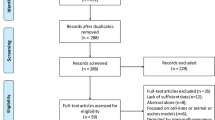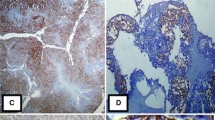Abstract
Purpose: CD44 is a cell surface receptor implicated in cancer progression and metastases. Malignant tumors may show a loss of CD44 splice control mechanisms. We investigated the role of CD44 splice variant expression in ovarian tumors and metastases, and its association with survival.
Experimental Design: We tested CD44 expression in 142 cases of epithelial carcinoma of the ovary and 265 metastatic sites by immunohistochemistry.
Results: Survival analysis showed that the expression of CD44s, CD44-v4,-v5, -v6, -v9, and -v10 are significant predictors for survival in univariate analysis. After stage, the expression of CD44-v10 in metastases was the strongest predictor of decreased survival in multivariate analysis (p=0.0009). Conversely, CD44-v10 expression in the primary tumor was an independent predictor of improved survival in multivariate analysis (p=0.0002). The expression of CD44s in the tumor/stroma interface of the primary tumor was associated with improved survival (p<0.0001).
Conclusions: CD44 variant expression is a molecular prognostic maker for epithelial ovarian carcinomas. CD44-v10 expression is an independent prognostic indicator and the site of expression determines a positive or negative influence in survival. Our results also indicate that CD44 may be involved in important tumor/stroma interactions.
Similar content being viewed by others
References
Kohn EC, Liotta LA. Molecular insights into cancer invasion: Strategies for prevention and intervention. Cancer Res 1995; 55:1856–1862.
Lee TH, Wisniewski HG, Vilcek J. A novel secretory tumor necrosis factor-inducible protein (TSG-6) is a member of the family of hyaluronate binding proteins, closely related to the adhesion receptor CD44. J Cell Biol 1992; 116:545–557.
Levesque MC, Haynes BF, TNFα and IL-4 regulation of hyaluronan binding to monocyte CD44 involves posttranslational modification of CD44. Cellular Immunology 1999; 193:209–218.
Gardner MJ, Jones L, Catterall J, Turner G. Expression of cell adhesion molecules on ovarian tumor cell lines and mesothelial cells in relation to ovarian cancer metastasis. Cancer Lett 1995; 91:229–234.
Chiu RK, et al. Alternatively spliced CD44 isoforms containing exon v10 promote cellular adhesion through the recognition of chondroitin sulfate-modified CD44. Experim Cell Res 1999; 248:213–321.
Goodison S, Tarin D. Current status of CD44 variant isoforms as cancer diagnostic markers. Histopathology 1998; 32:1–6.
Rodríguez-Rodríguez L, et al. CD44 splice variant expression in clear cell carcinoma of the ovary. Gynecol Oncol 1998; 71:223–229.
Darai E, et al. Analysis of CD44 expression in serous and mucinous borderline tumours of the ovary: Comparison with cystadenomas and overt carcinomas. Histopathology 1998; 32:151–159.
Ross JS, et al. Decreased CD44 standard form expression correlates with prognostic variables in ovarian carcinomas. Am J Clin Pathol 2001; 116:122–128.
Sancho-Torres I, Mesonero C, Miller-Watelet JL, Gibbon DG, Rodríguez-Rodríguez L. Clear cell carcinoma of the ovary. Characterization of its CD44 isoform repertoire. Gynecol Oncol 2000; 79:187–195.
Gibbon DG, et al. CD44 splice variants expression correlates with in vitro mestastatic potential in ovarian cancer cell lines. J Soc Gynecol Invest 1998; 5:82A-83A.
Saegusa M, Machida D, Hashimura M, Okayasu I. CD44 expression in benign, pemalignant, and malignant ovarian neoplasms: Relation to tumour development and progression. J Pathol 1999; 189:326–337.
Mackay CR, et al. Expression and modulation of CD44 variant isoforms in humans. J Cell Biol 1994; 124:71–82.
Rösel M, Khaldoyanidi S, Zawadzki V, Zoller M. Involvement of CD44 variant isoform v10 in progenitor cell adhesion and maturation. Exp Hematol 1999; 27:698–711.
Iida N, Bourguignon LY. Coexpression of CD44 variant (v10/ex14) and CD44s in human mammary epithelial cells promotes tumorigenesis. J Cell Physiol 1997; 171:152–160.
Cannistra SA, De Franzo B, Niloff J., Ottensmeier C. Functional heterogeneity of CD44 molecules in ovarian cancer cells. Clin Cancer Res 1995; 1:333–342.
Author information
Authors and Affiliations
Rights and permissions
About this article
Cite this article
Rodríguez-Rodríguez, L., Sancho-Torres, I., Mesonero, C. et al. The CD44 receptor is a molecular predictor of survival in ovarian cancer. Med Oncol 20, 255–263 (2003). https://doi.org/10.1385/MO:20:3:255
Received:
Accepted:
Issue Date:
DOI: https://doi.org/10.1385/MO:20:3:255




